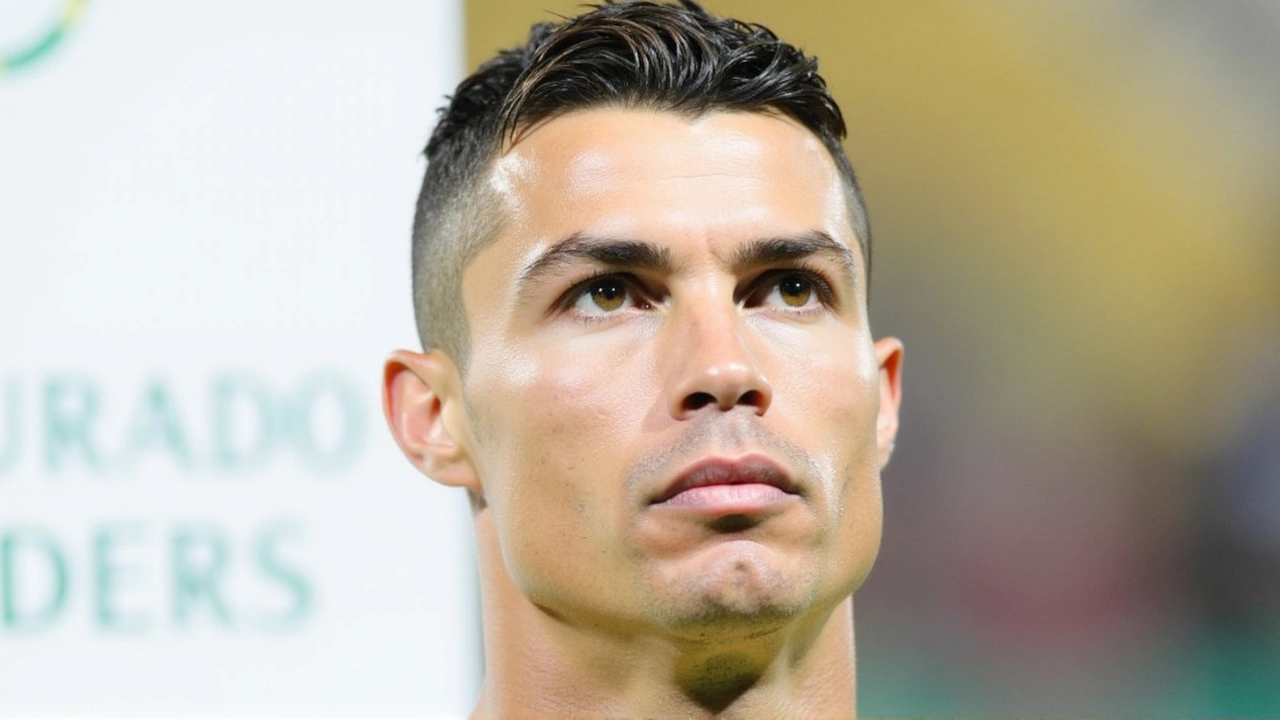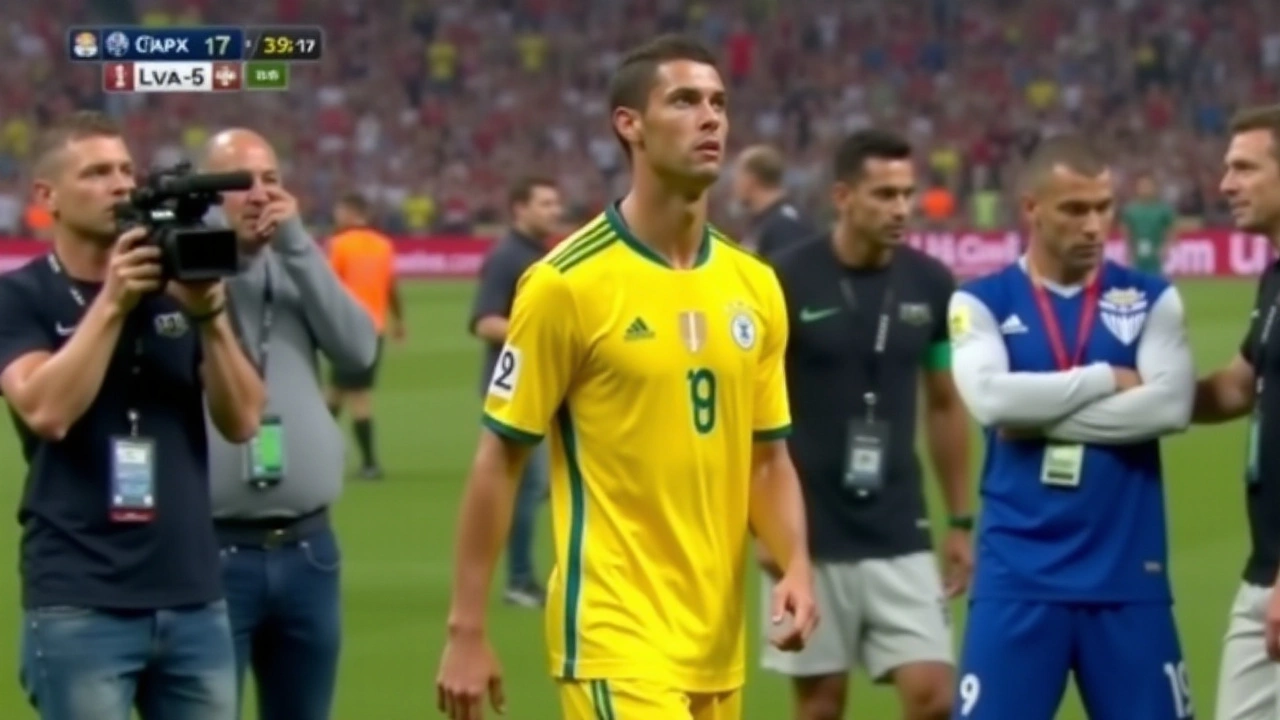Ronaldo's Disallowed Goals Stir Controversy in Al Nassr's Match
Cristiano Ronaldo, the globally celebrated Portuguese footballer, has once again found himself mired in controversy after a frustrating match with his current club, Al Nassr. During the game, Ronaldo had not one but two goals disallowed by the Video Assistant Referee (VAR), decisions that have sparked intense debate among fans and pundits alike. Known for his fiery passion and competitiveness on the field, Ronaldo's reaction was anything but muted. His seething frustration was palpable, not only to those present in the stadium but also to millions of viewers watching the game from all corners of the world.
Following the match, Ronaldo expressed his disappointment to his longtime acquaintance, British broadcaster Piers Morgan, a move that brought his feelings into the public domain. In their conversation, Ronaldo was quoted as saying, 'They don't like me,' in reference to the VAR decisions that went against him. This statement is emblematic of Ronaldo's ongoing dissatisfaction with what he perceives to be unfair treatment, not just in this particular match, but also across his illustrious career. His words continue to echo around the football community, as debates rage over the effectiveness and fairness of VAR technology. VAR, introduced to provide clarity and eliminate human error in critical match situations, has often been a double-edged sword, popular among some while igniting criticism from others.
The Role of Technology in Modern Football
Interestingly, Ronaldo's words to Morgan reinvigorate ongoing discussions about the role of technology in football. VAR was initially heralded as a revolutionary tool aimed at making the sport fairer and more transparent. However, its implementation has been far from smooth, and Ronaldo's recent plight is a case in point. The system has been criticized for its lack of consistency and the inevitable delays it causes during gameplay. Fans bemoan what they perceive to be the 'robotic' nature of the game post-VAR, with emotions running high as the spontaneity of celebrating a goal is often dampened by the wait for VAR confirmation.
In Ronaldo's case, the controversy revolves around the decisions being perceived as overly nitpicky or unjust. Such occurrences aren't isolated to Ronaldo or Al Nassr; they have been witnessed in various leagues across the globe. It raises pertinent questions about the subjective nature of certain calls and how human interpretation can affect supposed ‘foolproof’ technology. Ronaldo's claims about personal bias add another layer to the debate. Whether or not there is any credence to suggestions of bias against him, the idea that one of football's biggest stars believes it is enough to keep tongues wagging worldwide.
Exploring Ronaldo's Relationship with Officiating
This incident is not the first time Cristiano Ronaldo has publicly voiced his frustrations over officiating decisions. Throughout his career, Ronaldo has made headlines for several high-profile disputes involving referees and match officials. His recent candid interactions with Piers Morgan seem to reflect a deeper discontent that goes beyond the immediate grievances of disallowed goals in one game. Ronaldo, with a career spanning over two decades, has often been at the center of important plays, crucial for club and country. Given his high-profile status and talent, it's inevitable that expectations and pressure mount, sometimes leading to friction when matches don't go his way.
In an earlier interview with Morgan, Ronaldo discussed various incidents, voicing his displeasure on several issues—including his evolving views on Manchester United, especially related to their management and organizational structure. Some speculate that his comments highlight Ronaldo’s growing dissatisfaction with the current state of modern football, where business decisions often outweigh the sport's passion and spirit. His current outburst against VAR may very well be a cry for change and betterment in how the sport he loves is conducted on and off the field.
The Competitive Nature of Ronaldo
Ronaldo's reaction to the disallowed goals also brings to the forefront his intense competitive nature, long seen as both a driver of his success and a source of controversy. Known for his extraordinary drive, Ronaldo’s passion is a hallmark of his playing style, often pushing not just himself but also his teammates to deliver more on the field. This latest bout of frustration is aligned with his unyielding determination to secure victory, and celebrate every goal, justly and joyously. This passion, however, often brings him under scrutiny, particularly when it results in public displays of dissatisfaction.
Notably, Ronaldo's self-assertive nature and his reaction to perceived refereeing errors are emblematic of his larger-than-life persona. This competitive fire is not unfamiliar in sports legends, as we’ve seen similar reactions from icons in various sports who consistently strive for excellence and fairness in competition. Supporters and fans of Ronaldo see his frankness as a refreshing contrast to often-coached soundbites, valuing his honest, raw expressions as indicative of his love for the game. Nevertheless, it also feeds narratives that paint him as occasionally petulant, when decisions don't go his way, which becomes a point of contention among critics and those outside of his fan base.

The Impact on Al Nassr and the Footballing World
Al Nassr, the club now proudly home to Ronaldo, finds itself under the microscope as it navigates the notoriety that comes with employing a figure as polarizing and famous as Cristiano Ronaldo. With all eyes on both his footballing genius and his erratic criticisms, the club has become a focal point in ongoing global football discussions. A club with historical significance in domestic football, Al Nassr's acquisition of Ronaldo aims to elevate its presence on the international stage. This spotlight brings about new challenges and opportunities, notably in how the club manages media narratives surrounding such high-profile incidents.
The repercussions of Ronaldo's statements are far-reaching. Not only do they influence perceptions of Al Nassr's goodwill and the players' rapport with football's governing bodies, but they also send ripples throughout the wider sporting ecosystem. These situations prompt organizations such as FIFA and UEFA to re-evaluate how football's evolving technological landscape must adapt to meet both modern needs and traditional expectations. Further, this incident reinforces the need for dialogue between players, referees, and technology operators—to ensure fair play that aligns with the original spirit of the game. As football continues to grow and diversify around the globe, the need for consistent and equitable adjudication becomes ever more pressing.
